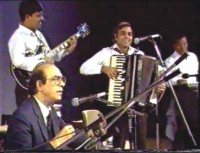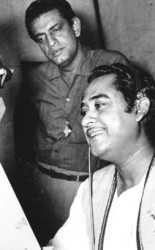|
Musings
Of Shondhya and Shaam in Song
Syed Badrul Ahsan
 |
Talat Mehmood |
There has always been a poignant quality about the evening. Or you could call it twilight. In poetry and music, in our part of the world, godhuli bela in Bangla and shaam in Urdu have been some of the terms we have employed in our evocation of the quiet beauty that descends on the world as the sun slips beyond the horizon. When you listen to songs in Bangla, there is the pretty real possibility that your idea of romance, of separation from the beloved, just might come encapsulated in poetry fashioned at dusk. Saiful Islam's tumi shondhakasher tarar moto amar mone jolbe causes a stir to rise in your heart. The stirring reaches a different sort of intensity when you sing Tagore's aaji shanjher Jamunaye go / toruno chander kirono tori bheshe jaye go. Indeed, if in the former song you have occasion to recall the grace and beauty of the one you love, through the latter you experience the transcendence that comes with watching a river flow along its banks and then relating the flow to pure spiritual sublimity.
 |
Mohammad Rafi |
There is then the rather flippant or the pretty youthful exuberance brought on by romance when you think of Subir Sen's shondhya logone shopno mogone / amra dujone / shonali shobuj prantore aaj hariye jai. The point with this song, as with so many others of its kind, is that the setting sun or the early stars in the sky do not necessarily have to reverberate with ponderous thoughts. They can be redolent of the good cheer which lights up our lives at certain points. That said, though, there is the persistent feeling that substance actually is to be had in songs that reflect the sadness of the soul at twilight. You can remember the pathos which underlies Talat Mehmood's sham-e-gham ki qasam aaj ghamgeen hain hum / aa bhi ja aa bhi aaj mere sanam. Some of the more gripping of sings composed around the theme of evening or twilight shines through in lyrics shaped for Urdu-language based movies in India, especially in the times between the 1950s and 1960s, to a certain extent stretching into the early 1970s. The ambience of shaam was what you noticed in Talat Mehmood's voice, proof of which comes through once more in the number phir wohi shaam wohi gham wohi tanhai hai / dil ko samjhane teri yaad chali ayee hai. And then of course there is the versatility of Mohammad Rafi, whose quiet reflections on the lover transform love into unity of time and space with the onset of evening. That is the essence of the song hui shaam unka khayal aa gaya / wohi zindagi ka sawal aa gaya. You can almost put your finger on something bordering on the philosophical here as the man singing the song relates his sentiments about the woman he loves to the broader question of what life is all about.
 |
Kishore Kumar |
The unchanging nature of love between man and woman forms the bedrock of the Kishore Kumar number wo shaam kuch ajeeb thi yeh shaam bhi ajeeb hai / wo kal bhi paas paas thi wo aaj bhi qareeb hai. It could be that a chasm has come between that first evening and the new one; it may well be that the beloved is conspicuous by her absence. But those pristine stirrings of the heart are nevertheless as spring-like as they once were. The heart may break, as in the song Pakistan's Selim Raza sang long ago: shaam-e-gham phir aa gayi / phir udasi chhaa gayi. And yet somewhere in the sensibilities some string remains intact, enough to leave the lover hoping for a return to the garden where blossoms once tugged at hearts newly stumbled upon romance. Nothing can be more severe than the long wait a man may plod through in expectation of the demure woman he has caused to be brought to life, in that passionate way that love has about it. Which is when you go back to Mohammad Rafi, to observe the silences in his soul give way to a polite complaint lodged against the beloved: din dhal jaye hai raat na aaye / tu to na aaye teri yaad sataye. Similar feelings, or almost, arise in the Bashir Ahmed number, dhalta hua wo suraj kehta hai karke ishara / main ne to din guzara rahi tera kaun shara. It has been a day, just a day, but it has been one steeped in the sadness of poetry.
But sadness need not be a lasting affair. When Rafi sings, tumhari zulf ke saaye mein shaam kar loonga, you realise how within the palpitations of the love-suffused heart twilight can be created to supplant the one, the real one, that is yet to be. In the long, falling and dispersing tresses of the loved woman, you imagine the arrival of evening even as you scent the heaving passion welling up from deep within her. There are then the moments when you watch the grey dusk cool the beauty of the woman who loves you, moments that leave you in a state of stupor as you sing the Kishore lyrics, yeh sham mastani madhosh kiye jaye / mujhe dor koi kheenche teri or liye jaye. Or there is that other Kishore number for you to fall back on, bhali bhali si ik surat bhala sa ik naam / dharhkan ho mere dil ki subah ho ya shaam.
But twilight in beauty does not last, not in songs, not in life. When the crickets begin to sing in abandoned cemeteries and the rural paths in the far distance are traversed, in the gathering gloom, by a solitary, ageing peasant, it is Thomas Gray who pushes everything aside, to tell you that the end of the day is but one more step toward endless silence. Again, it is Rafi who reinforces those ancient thoughts of mortality, as in this soul-crippling song, raat jo aaye dhal jaye piyasi / din ka hai duja naam udasi.
Copyright
(R) thedailystar.net 2007 |
|
